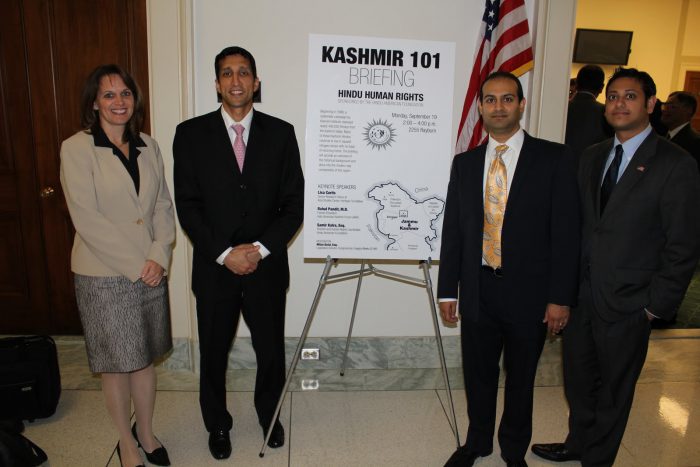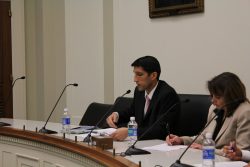Capitol Hill Briefing focuses on human rights struggle of Kashmiri Hindus

Beginning in 1989, a systematic campaign by Islamist militants cleansed nearly 400,000 Hindus from the Kashmir Valley. Many of these Kashmiri Hindus (Pandits) continue to live in squalid refugee camps with no hope of returning home. On August 1, 2011, Congressman Frank Pallone introduced H. Res 387 which recognizes and condemns the religious persecution and human rights violations faced by Kashmiri Hindus. The resolution is currently pending before the House Foreign Affairs Committee. The briefing will provide an overview of the historical background and delve into the modern-day complexities of the region.
Date: Monday, September 19
Time: 2:00pm – 4:00pm
Location: 2255 Rayburn House Office Building, 45 Independence Ave, SW. Washington, D.C.
Keynote Speakers:
Lisa Curtis – Senior Research Fellow at Asia Studies Center, Heritage Foundation
Rahul Pandit, M.D. – Past-President, Indo-American Kashmir Forum (IAKF)
Samir Kalra, Esq. – Director and Human Rights Coordinator, Hindu American Foundation
Participants of Kashmir Briefing, Washington D.C.Washington, D.C. (September 23, 2011) – New attention was focused on the forced religious cleansing of an estimated 400,000 Hindus, known as Pandits, from the Kashmir Valley in the Indian state of Jammu and Kashmir at a Capitol Hill briefing entitled “Kashmir 101: Hindu Human Rights.” Sponsored by the Hindu American Foundation (HAF), the September 19 briefing held in a House of Representatives Foreign Affairs hearing room featured Rahul Pandit, M.D., past president of the Indo-American Kashmir Forum; Lisa Curtis, Senior Research Fellow at Asia Studies Center of the Heritage Foundation; and Samir Kalra, Esq., HAF’s Director and Senior Fellow for Human Rights. The panel discussion was moderated by Milan Dalal, Esq., Legislative Director for Rep. Gregory Meeks (D-NY). The event was attended by many congressional staffers, representatives of think tanks and human rights groups, and embassy officials.
Beginning with a historical narrative of the accession of Kashmir to India in 1947, Kalra recalled Pakistan’s multiple failed military attempts to forcibly occupy the entire Kashmir valley, and its reliance on a proxy war against India by fostering a jihadi terror infrastructure in the mid-1980s. Heightened Islamist terror campaigns led to the killings of thousands of Kashmir’s Hindu Pandits and forced their exodus in 1989, Kalra said during his address.
Kalra highlighted House Resolution 387 introduced by Rep. Frank Pallone (D-NJ) that recognizes the human rights violations against the Hindu Pandits in Kashmir and demands that the terrorist infrastructure in the region be dismantled.
“While the United States should continue to closely watch developments in Kashmir, it should resist the temptation to pursue a direct role in mediating the crisis as such a move could exacerbate tensions and raise false hopes among Kashmiri separatists,” said Curtis during her address. She also rejected the claim that continuing Pakistan-sponsored terror attacks in India are motivated by the unrest in India’s Kashmir. “The Mumbai attacks, for example, only demonstrate that Pakistan-based terrorists are more interested in trying to sabotage India’s emerging power status rather than making any statement on Kashmir,” she added.Dr. Pandit Speaks at Kashmir Briefing, Washington, D.C.
Tracing the history of the Kashmiri Hindu Pandit population as the original inhabitants of the valley prior to Islam’s introduction in the fourteenth century, Dr. Pandit described the religious traditions and culture of the Pandits and the conditions of refugee camps in Jammu nearly twenty years on. “Though Pandits can trace their history in the Kashmir Valley back nearly five millenia, today’s reality is that less than 3,000 remain there and between 70,000 to 80,000 Pandits continue to live in squalid refugee camps in Jammu, 20 years after their forced migration from their homeland.”
of the valley prior to Islam’s introduction in the fourteenth century, Dr. Pandit described the religious traditions and culture of the Pandits and the conditions of refugee camps in Jammu nearly twenty years on. “Though Pandits can trace their history in the Kashmir Valley back nearly five millenia, today’s reality is that less than 3,000 remain there and between 70,000 to 80,000 Pandits continue to live in squalid refugee camps in Jammu, 20 years after their forced migration from their homeland.”
The briefing came exactly two months following the arrest of Ghulam Nabi Fai by the Federal Bureau of Investigation (FBI) over allegations that his Kashmir American Council was controlled by the dreaded Pakistan spy agency, the Inter-Services Intelligence.
“HAF hopes that this first briefing on Kashmir after Fai’s arrest addressing unrest there and the Pandit story resets the conversation on Kashmir, unencumbered by the propaganda that shaped previous narratives about the region,” Kalra added.





